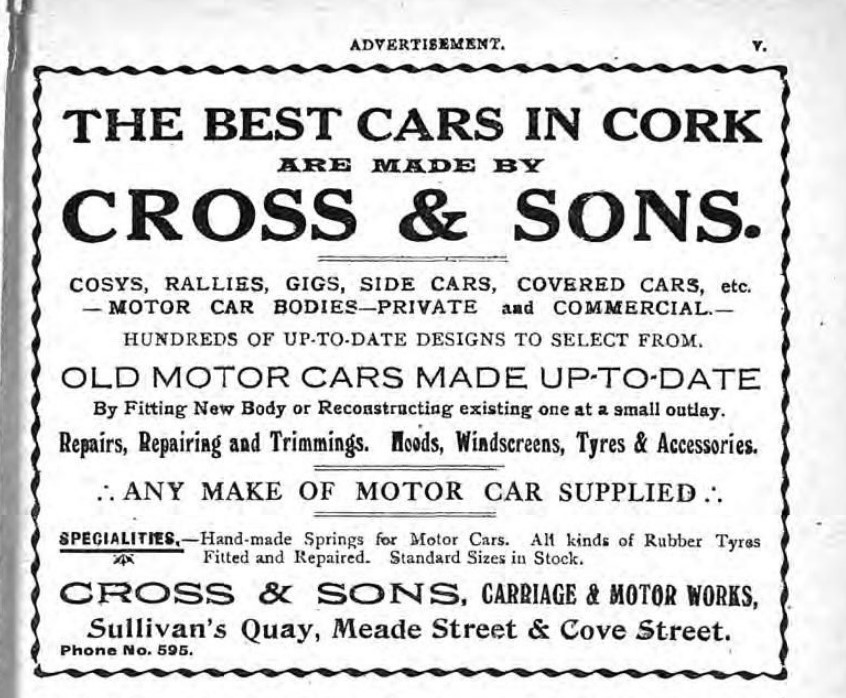
Kieran’s Our City, Our Town Article,
Cork Independent, 16 February 2023
Recasting Cork: A New Motor Association
In January and February 1923, debates by motor car owners on the growth of motor car ownership in Cork led to rising concerns on inadequate road infrastructure and questions on road taxation. A public meeting of owners of private and commercial motor cars was held on the weekend of the 17 February 1923 at Cork’s Victoria Hotel for the purpose of approving the formation of an Association to be known as the Munster Motor Association.
Over one hundred replies were received to a circular sent out, all promising support, and undertaking to join the Association. In addition, there were about fifty owners at the meeting, representing private owners, hirers, garage owners and commercial owners.
The Cork Examiner on 19 February 1923 notes Mr Richard H Tilson was appointed to the chair. Richard was a director of Messrs Cade & Sons Ltd Mineral Manufacturers and was former High Sheriff of Cork for three years, 1913-1915. He was a motor car enthusiast and was a founding member of the Munster Motor Association.
The Chairman, Richard Tilson, felt it was apparent from the large and representative nature of the meeting and the number of signed assents received that they were justified in the formation of the Association. They wished to be law-abiding and wanted to protect car owners and wanted the public to be aware of their aims.
Tilson noted that they had no intention of creating difficulties for the Irish Free Government or the local authorities. They were not there to resist in any “violent manner” whatever obligations were imposed upon them, but they considered the existing road tax for motor cars unjust and that the road tax needed to be reformed. The taxes, Tilson detailed, went towards many purposes, including the upkeep of local roads. He also highlighted that the motor tax was also supposed to go directly towards the requirements necessary for “improved modern locomotion”.
The Association were going to insist on greatly improved road conditions. Tilson commented that the Association needed to champion improvements in road fabric, danger points, and movement of horse and pedestrian traffic. He believed that a large percentage of horse-drawn vehicles did not even observe the rules of the road. He hoped to approach the local authorities in a constructive way with a view to making the roads safe for the public at large. He commented: “The motorist was an exceedingly blamed individual, and more stringent regulations would have to be introduced to deal with horse traffic, even in the City of Cork”.
Tilson also wanted to see horse-drawn vehicles to pay motor tax: “If a motor ear owner paid £20 per year as tax, towards the improvement of the roads, why not a horse-drawn vehicle…if a community raised a considerable sum for road improvement, why that should not be contributed to by the imposition of a small tax on horse-drawn vehicles, to provide for the wear and tear of the roads”.
Tilson hoped that the Munster Motor Association would grow in membership in the City and County of Cork and especially throughout Munster. He aimed that they should have a membership of 3,000, and if they took the valuation of each of those members at £50 at a moderate average each it would represent a valuation of £150,000, which would represent roughly £90,000 in road tax. This was, as Tilson highlighted, an enormous amount of taxation. He also commented that if they took the number of motor cars on the road at 2,000, with an average value of £400 it would represent acapital investment of £800,000 in local economies.
It was unanimously agreed that the resolution previously passed on the subject be rescinded and that the Association be called the Munster Motor Association instead of the City and County of Cork Motor Association.
Mr K O’Neill (Kinsale) said he was originally against the Association spreading its membership outside the City and County of Cork. He thought they would have enough to contend with, but on hearing concerns further afield in Munster he thought they were justified in pushing for a broader membership base. Mr O’Neil wanted fair taxation: “The question of tax was on everybody’s mind, and they were prepared to pay their share towards the upkeep of the roads, but they were all agreed that the tax falling on the shoulders of the motor owners was altogether too high, and though they may have to pay the tax in the present instance, in the future it would be their duty to try and get it modified – they were prepared to accept their responsibilities, but those responsibilities must be fair”.
Mr O’Neil pointed out that the Association was not for the purpose of taking up individual grievances but was established with a view to benefiting the community of motor owners as a whole. He proposed: “That this large and representative meeting of owners of private and commercial motor cars hereby endorse the decision of a previous meeting forming the Munster Motor Association, and all present agree to join the said Association and to its future success”. Mr Mahony of the Universal Motor Company seconded the resolution, which was unanimously passed.
The Munster Motor Association lasted for several years before it was amalgamated into the Royal Irish Automobile Club (established in 1901).
Captions:
1189a. Advertisement of the sale of motor cars at Cross & Sons from Guy’s Directory of Cork, 1921 (source: Cork City Library).